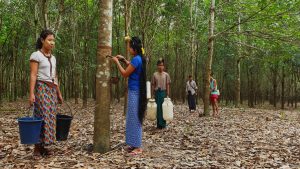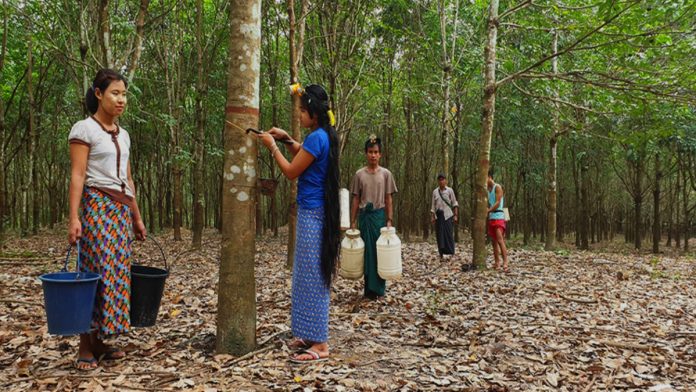The curfew law and security restrictions are making life more difficult for rubber farmers in southern Mon state.

“Covid-19 prohibitions and travel restrictions make life difficult. Now, the number of checkpoints has increased. If you go to the farm, you have to get a letter of recommendation,” said Nai Kyi Win, owner of a rubber plantation in Yebyu Township.
The movement of People Defense Force (PDF) troops near Ye Township is also causing hardship for the workers. Mi Aie Swan, who works at the rubber plantation was forced to arrive late because of tight security at the entrances and exits of the town.
Mi Aie Swan explained, “there is no income. Recently, when the price of rubber improved and although it was a rainy day, we went to the farm to try and earn some money. On the way, the soldiers asked us a lot of questions. It is not convenient to go to the farm early in the morning as before.”
Security has also been tightened in Thanbyuzayat Township causing inconvenience for those going to the rubber plantation, explained Min Htet, a local resident.
He said, “scraping (tapping) rubber is a midnight job. It is normal work that I will go to the farm, I will tap the trees and I will come back. If I get it, I will sell it. But now there are curfew laws preventing me from leaving at night, and also the current political security situation is not good news. The rubber plantation is quite far. Also, the police and soldiers stop and check us and ask a lot of questions. It is difficult to tap the rubber at night, as we face a lot of anxiety.”
Since February, the military has prohibited public gatherings of five or more people and imposed a curfew preventing travel from 8 pm to 4 am.
Exports of rubber are rising and market demand is high at the moment. Mon State traders estimate that despite the closure of border crossings, rubber prices are on the rise due to increasing demand for rubber products. There are 500,000-acres of rubber plantation, which is a major economic activity in Mon State.

